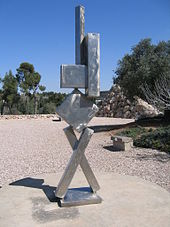Cubi

The Cubi series is a group of stainless steel sculptures built from cubes, rectangular solids and cylinders with spheroidal or flat endcaps. These pieces are among the last works completed by the sculptor David Smith. The artist died in a car accident on May 23, 1965, soon after the completion of Cubi XXVIII, which may or may not have been the last sculpture he intended to create in this series. The Cubis are among Smith's final experiments in his progression toward a more simplified, abstract form of expression. As an example of modernism, these are representative of the monumental works in industrial materials that characterized much of the sculpture from this period.
Although the Cubis are abstract works composed of geometric shapes, they are ambiguously figural. For example, the pictured Cubi VI appears to be standing on a pair of crossed legs. Like many of the abstract expressionists, Smith possessed the ability to easily switch between an abstract and figurative style of working. His process also involved going back and forth between the different stages of development within a certain style or serial group, as suggested by the Cubis. These sculptures were not completed in the order in which they are numbered, as revealed by the inscriptions (see below) that Smith welded onto the base of each.[1]
Today, the majority of the Cubi works are part of well-known museum collections around the world, including the Museum of Modern Art in New York, the Tate Modern in London and the Art Institute of Chicago. In 2005, Cubi XXVIII was sold at Sotheby's for $23.8 million, breaking a record for the most expensive piece of contemporary art ever sold at auction.[2] "This exceedingly rare work was the pinnacle of a four-decade career," said Tobias Meyer, Sotheby's worldwide head of contemporary art and the auctioneer for the evening.
- Cubi I March 4, 1963
- Cubi II October 25, 1962
- Cubi III November 10, 1961
- Cubi IV January 17, 1963
- Cubi V January 16, 1963
- Cubi VI March 21, 1963
- Cubi VII March 28, 1963
- Cubi VIII December 24, 1962
- Cubi IX October 26, 1961
- Cubi X April 4,1963
- Cubi XI March 30, 1963
- Cubi XII April 7, 1963
- Cubi XIII March 25, 1963
- Cubi XIV September 25, 1963
- Cubi XV September 27, 1963
- Cubi XVI November 4, 1963
- Cubi XVII December 4, 1963
- Cubi XVIII February 14, 1964
- Cubi XIX February 20, 1964
- Cubi XX February 20, 1964
- Cubi XXI April 4, 1964
- Cubi XXII June 5, 1964
- Cubi XXIII November 30, 1964
- Cubi XXIV December 8, 1964
- Cubi XXV January 9, 1965
- Cubi XXVI January 12, 1965
- Cubi XXVII March 5, 1965
- Cubi XXVIII May 5, 1965
References
[edit]- ^ Rosalind E. Krauss, The Sculpture of David Smith: A Catalogue Raisonne, 1977.
- ^ "David Smith's CUBI XXVIII Sells for $23.8 Million". Artdaily.org.
- Carmean, E. A. David Smith. Washington: National Gallery of Art, 1982.
- Hamill, Sarah. David Smith: Works, Writings, Interview. Barcelona: Ediciones Poliígrafa, 2011.
- Kramer, Hilton. “A Critic Calls David Smith ‘Greatest of All American Artists.’” New York Times Magazine, February 16, 1969, 40-62.
- Krauss, Rosalind E. Terminal Iron Works: The Sculpture of David Smith. Cambridge, MA: MIT Press, 1971.
External links
[edit]- Cubi I at the Detroit Institute of Arts
- Cubi II, in a private collection
- Cubi III at the Museum of Contemporary Art, Los Angeles
- Cubi IV at the Milwaukee Art Museum in Milwaukee, Wisconsin
- Cubi V owned by the Jon and Mary Shirley Foundation
- Cubi VI at the Israel Museum in Jerusalem, Israel
- Cubi VII at the Art Institute of Chicago, Chicago, Illinois
- Cubi VIII at the Meadows Museum at Southern Methodist University, Dallas, Texas
- Cubi IX at the Walker Art Center in Minneapolis, Minnesota
- Cubi X at the Museum of Modern Art in New York, New York
- Cubi XI owned by the Morris and Gwendolyn Cafritz Foundation, on display at the National Gallery of Art in Washington, D.C.
- Cubi XII at the Hirshhorn Museum in Washington, D.C.
- Cubi XIII at the Princeton University Art Museum, in Princeton, New Jersey
- Cubi XIV at the Saint Louis Art Museum in St. Louis, Missouri
- Cubi XV at the San Diego Museum of Art in San Diego, California
- Cubi XVI at the Albright-Knox Art Gallery, Buffalo, New York
- Cubi XVII at the Dallas Museum of Art
- Cubi XVIII at the Museum of Fine Arts, Boston
- Cubi XIX at the Tate Gallery
- Cubi XX at the Franklin D. Murphy Sculpture Garden
- Cubi XXI at the Storm King Art Center owned by the Lipman Family Foundation
- Cubi XXII at the Yale University Art Gallery
- Cubi XXIII at the Los Angeles County Museum
- Cubi XXIV at the Carnegie Museum of Art, Pittsburgh, Pennsylvania
- Cubi XXV owned by Jane Lang Davis
- Cubi XXVI at the National Gallery of Art in Washington, D.C.
- Cubi XXVII at the Solomon R. Guggenheim Museum
- Cubi XXVIII purchased at auction in 2005 by Eli Broad
